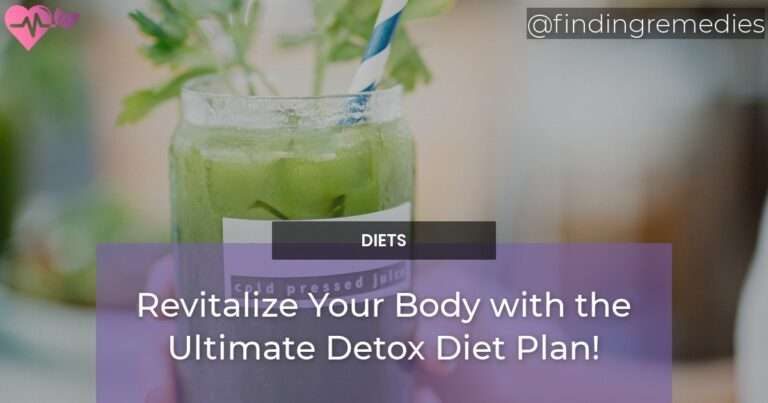A detox diet, also known as a cleansing diet, is a popular diet plan that involves consuming nutrient-dense, whole foods to help promote liver detoxification and colon cleansing. This type of diet plan has become increasingly popular in recent years as people look for ways to improve their health and reach their weight loss goals.
In this comprehensive guide, we will explore the key components of a detox diet plan, the health benefits of following this type of diet, the scientific evidence behind it, tips for success, risks, and precautions to consider, and how to incorporate it into your lifestyle.
Table of Contents
Key Components of a Detox Diet
A detox diet involves consuming nutrient-dense, healthy foods that are primarily plant-based. Here are the key components of a detox diet:
Fruits and Vegetables
Fruits and vegetables are rich in antioxidants, phytochemicals, and fiber, which help to support your digestive system, eliminate toxins, and promote healthy skin. Aim to eat a variety of colors to ensure you are getting a broad range of nutrients. Organic produce is preferred to avoid pesticides.
Whole Grains
Whole grains such as brown rice, quinoa, and oats are a great source of fiber and essential nutrients that help to promote healthy digestion and elimination. Avoid processed grains like white flour and white rice.
Lean Protein
Plant-based protein sources such as beans, lentils, and nuts, are excellent sources of protein, which helps to repair and build tissues in the body. Avoid consuming red meat and processed meats.
Healthy Fats
Healthy fats such as those found in avocados, nuts, and seeds, are essential for optimal health, including healthy skin, brain function, and hormone regulation. Avoid trans fats found in processed foods.
Herbs and Spices
Herbs and spices such as turmeric, ginger, and garlic, have been shown to have anti-inflammatory properties and may help to improve digestion and eliminate toxins.
Water
Water is essential for flushing out toxins and preventing dehydration. Aim to drink at least 8-10 glasses of water per day.
Health Benefits of a Detox Diet
Following a detox diet can provide numerous health benefits, including:
Boosts Energy
A detox diet can help to increase your energy levels by eliminating processed foods and sugar, which can cause energy crashes.
Improves Digestion
The high fiber content of a detox diet can help to improve digestion and promote healthy bowel movements.
Enhances Immune System
Foods such as fruits and vegetables, which are rich in vitamins and minerals, can help to support your immune system and protect against disease.
Supports Weight Loss
A detox diet can help to kickstart weight loss by eliminating processed foods and sugar and increasing nutrient-dense, whole foods.
Reduces Inflammation
A detox diet can help to reduce inflammation in the body by eliminating processed foods and sugar and increasing anti-inflammatory foods such as fruits, vegetables, and healthy fats.
Promotes Healthy Skin
The high antioxidant content of a detox diet can help to promote healthy skin by protecting against free radical damage.
Scientific Evidence Behind Detox Diet
While there is some scientific evidence supporting the effectiveness of a detox diet, there are also controversies and limitations to consider.
Studies Supporting Detox Diet
Studies have shown that following a detox diet can lead to weight loss, improved digestion, and decreased inflammation in the body.
Controversies and Limitations
Some experts argue that the body has its own detoxification system and that a detox diet may not be necessary. In addition, some detox diets promote extreme calorie restriction, which can lead to nutrient deficiencies and disordered eating.
Tips for Success on Detox Diet
Here are some tips for success when following a detox diet:
Plan Ahead
Plan your meals and snacks in advance to ensure you are consuming a variety of nutrient-dense, whole foods.
Implement Gradual Changes
Gradually eliminate processed foods and sugar from your diet to avoid cravings and potential side effects.
Incorporate Exercise
Incorporate regular exercise into your detox diet plan to support weight loss and overall health.
Stay Hydrated
Drink plenty of water to help eliminate toxins and prevent dehydration.
Risks and Precautions to Consider
While a detox diet can provide numerous health benefits, there are also risks and precautions to consider.
Nutrient Deficiencies
Extreme calorie restriction can lead to nutrient deficiencies and potential health problems.
Dehydration
Drinking too much water in a short period of time can lead to electrolyte imbalances and dehydration.
Blood Sugar Imbalance
Eliminating carbohydrates and consuming too few calories can lead to blood sugar imbalances and potential health problems.
Disordered Eating
Following a detox diet can potentially lead to disordered eating patterns and negative relationships with food.
Conclusion
A detox diet can be an effective way to promote liver detoxification, colon cleansing, and overall health. By consuming nutrient-dense, whole foods and eliminating processed foods and sugar, you can achieve numerous health benefits, including weight loss, improved digestion, and reduced inflammation. However, it is important to consider the risks and precautions and to implement the diet plan gradually and under the guidance of a healthcare professional.

